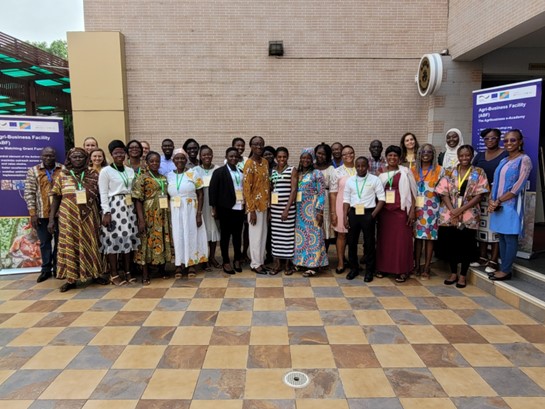The GIZ project’s Market Oriented Value Chains for Employment and Growth in the ECOWAS Region (MOVE), in collaboration with Agri-Business Facility (ABF) for Africa, has organised the first Gender makes Business Sense plus training.
Held in Accra, the training event is a development journey intended to help agripreneurs improve their knowledge on how to run successful businesses that take gender equality into account.
Another goal of Gender makes Business Sense plus (GmBSplus) is to demonstrate how a cooperative strategy between women and men, public and private sector sectors and groups can improve gender disparities across the value chains of agriculture.
“I am very honoured to open today’s pilot training Gender makes Business Sense plus – in brief, GmBSplus. The purpose of GmBSplus is to improve the well-being of agripreneurs and their communities by creating profitable agribusinesses that enable employment opportunities,” said Magnus Schmid, Head of Projects at ABF.
The event offers participants a chance to connect with facilitators and mentors who are conscious of their local realities, and discuss their business ideas and challenges as well as insights.
It brought together 15 participants, including men and women farmers from various parts of the country and five trainers/instructors from Ghana, Togo and Benin.
Mr. Schmid acknowledged in his address that as women take care of their family’s survival and develop effective home management skills, they are able to make enough financial provisions for every member of the family; hence it is relevant to give them key insights on how to run a successful business.
“Studies show that women’s economic empowerment is essential for inclusive growth in Africa! If women in agricultural enterprises have access to inputs, knowledge and other production factors, they could increase yields by up to 30 percent. This is confirmed by a recently published FAO study,” he added.
Ms. Paulina Addy, Director for Women in Agriculture Development (WIAD), also outlined some interventions WIAD is implementing to support women.
“WIAD, through assistance from Canada, spearheaded adoption of the Regional Gender Action Plans (RGAPS) to facilitate access to funds at the regional level to support women; especially at the post-production stage of agriculture,” she said.
“Gender makes Business Sense is indeed a game-changer we can leverage to provide opportunities for transforming unprofitable agribusiness ventures. Thankfully, the Food and Drugs Authority is also on hand to support small businesses to gradually scale-up with quality as a hallmark,” she added.










